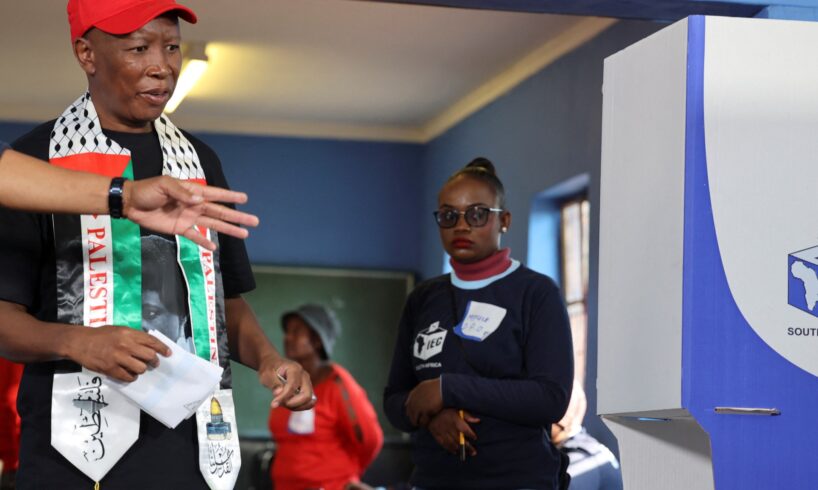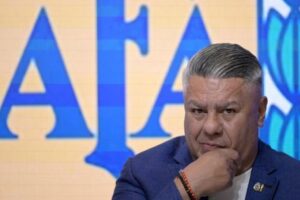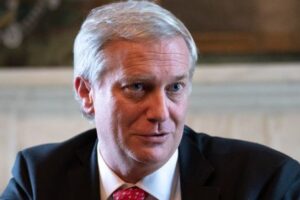
South African opposition leader Julius Malema was found guilty of hate speech by the country’s Equality Court on Wednesday this week over comments he made during a political rally in 2022.
This is the third such ruling for the frequently outspoken and controversial leader of the left-wing Economic Freedom Fighters (EFF) party.
In May, United States President Donald Trump accused South Africa of discriminating against whites in the country, citing Malema as the leader of an anti-white movement. Relations between the two countries soured dismally this year, with Washington cutting aid to Pretoria and imposing high tariffs.
Here’s what we know about the conviction and Malema’s run-ins with the law:
Who is Julius Malema?
Malema, 44, is a longtime politician in South Africa and the founder of the EFF, a small leftist party that is notable for its focus on the rights of Black South Africans. Its members often don red berets or military-style clothing.
Malema is known for his outspoken criticism of the major governing party, the African National Congress (ANC). He was formerly president of the ANC Youth League, until he was expelled in 2012 for going against then-president Jacob Zuma.
The politician has championed controversial policies that many white South Africans see as targeting them, such as expropriating land without compensation and nationalising South African mines, both for the benefit of Black South Africans. Apartheid-era policies saw Blacks disadvantaged in access to wealth and land. That legacy persists today, with most of the country’s privately-owned land still being white-owned.
Malema’s vocal support for the Palestinian armed group, Hamas, has also drawn controversy.
In June, Malema was denied a visa to the United Kingdom because he was regarded as “non-conducive to the public good”, according to the UK Home Office. The EFF described the move as an act of “cowardice”.
The EFF has 39 members of parliament. It came fourth in South Africa’s general elections last May, and is not part of the governing coalition government.
An electoral poster of the Economic Freedom Fighters (EFF) leader Julius Malema is seen in Polokwane, on May 2, 2024, before the 2024 South African general election [File: Lucas Ledwaba/AFP]
On Wednesday, in a case brought by the South African Human Rights Commission, the Western Cape Division of South Africa’s Equality Court found Malema guilty of hate speech because of comments he made at a rally in Cape Town in October 2022, which the court said violated the country’s Promotion of Equality and Prevention of Unfair Discrimination Act.
At the time he made the comments, Malema was addressing EFF colleagues. He referred to an earlier incident in which party members had come to blows with some white residents outside the Brackenfell High School. Black protesters had gathered outside the school to protest against the alleged exclusion of Black students.
Afterwards, Malema criticised his colleagues for not retaliating more forcefully. He urged them to “follow up” with one white man seen in the footage so that the man could be “attended to properly”.
Malema went on to say that “revolutionaries must not be scared to kill,” and that racist acts should be interpreted as “an application to meet your maker with immediate effect”.
“No white man is going to beat me up… Revolution demands that at some point there must be killing,” he said.
The statements, the court found on Wednesday, could be interpreted as “a clear intention to incite harm”.
“Whilst calling out someone who behaves as a racist may be acceptable, calling for them to be killed is not,” the court said in its ruling.
No punishment orders have been made yet, but Malema could face an order to apologise publicly, be forced to pay compensation or be recommended for criminal prosecution.
Julius Malema, leader of the Economic Freedom Fighters (EFF), arrives at Cape Town City Hall before the State Of The Nation (SONA) address by South African President Cyril Ramaphosa in Cape Town, South Africa, on February 6, 2025 [Nic Bothma/Reuters]
What have Malema and the EFF said about the court’s ruling?
In a statement reacting to the ruling on Wednesday, the EFF accused the court of presenting a “grave distortion” of history and political speech, and of “attacking” democracy.
Malema’s comments, the party argued, were made in relation to South Africa’s history of apartheid and subsequent liberation movements, and were meant “theoretically”. The EFF argued that the court had taken Malema’s words out of context and disregarded the events surrounding it, including the Brackenfell school incident and the country’s apartheid history.
“This decision is fundamentally flawed and deliberately misreads both the context and the meaning of the speech,” the EFF said.
“When Malema spoke of ‘war’, it was a reference to the irreconcilable conflict between white supremacy and Black consciousness, a war of ideas and systems, not an instruction to kill people,” the statement further read.
Has Malema been accused of hate speech before?
Yes, Malema has appeared in court several times for alleged hate speech. He has been found guilty twice, although one ruling was overturned.
In 2009, he was found guilty of hate speech against a woman who had accused former President Zuma of rape. At the time, Malema and Zuma were close. In a comment, Malema said the woman “had a nice time” with Zuma. The Equality Court ordered him to publicly apologise to the accuser, and to pay 50,000 rand ($2,824) to a centre for abused women.
He was again found guilty of hate speech in 2011 for singing the isiXhosa song Dubul’ibhunu or “Kill the Boer” at a rally. The song, which refers to white Afrikaans speakers, became popular in the 1980s when Black opposition to white minority rule was ramping up. The country’s apartheid government collapsed in 1994, when Black people were able to vote for the first time.
Later, in 2022, after Malema was once more taken to court for singing racially charged songs, the Equality Court overturned that earlier judgement, accepting Malema’s arguments that the lyrics were not meant literally, but as a metaphorical statement of resistance.
Afrikaner lobby groups, such as the AfriForum, have continued to appeal the overturning of that ruling. In May, the Constitutional Court dismissed another suit to appeal the case.
Has Trump cited Malema in his allegations of ‘white genocide’?
Yes, US President Donald Trump has referred to Malema’s speeches as evidence of an alleged “white genocide” in South Africa.
Trump, as well as senior officials in his administration, including former adviser Elon Musk, have also backed claims by fringe white South African groups that a genocide of white people is taking place in South Africa.
Several South African experts have debunked this claim, however, and say there is no evidence that white people are being targeted for their race in the country.
Despite this, Trump has used those claims to justify his cutting of foreign aid to South Africa in March and imposing high trade tariffs on the country. He also criticised South Africa for taking Israel to the International Court of Justice (ICJ) on allegations that it is committing genocide in Gaza.
In February, the Trump administration launched a refugee programme for white South Africans, even as the US halted migrant protection programmes for people from Afghanistan, for example. Some 59 white South Africans have since migrated to the US as refugees under the new programme. Additionally, the South African ambassador to the US, Ebrahim Rasool, was expelled in May.
When President Cyril Ramaphosa visited the White House in May, in an attempt to rebuild the countries’ worsening relations, Trump confronted his counterpart with old clips of Malema’s rallies and songs and reiterated claims of whites being targeted.
Ramaphosa explained that Malema’s EFF is not part of the governing coalition government and is in opposition to the president’s ANC party. He also told Trump that claims of white South Africans being targeted were false, although he acknowledged that the country is facing high crime rates.
Musk, Trump’s former adviser, was also present at the high-profile meeting. Musk, who has South African citizenship, has in the past posted clips of Malema’s songs and accused the politician of “actively promoting white genocide”.
How are relations between South Africa and the US generally?
Tensions remain high between the US and South Africa. On Wednesday, South Africa’s foreign minister, Ronald Lamola, while speaking to the press, accused the US of preferential treatment of white South Africans and Washington of a second apartheid.
The “refugee programme is preferential treatment of Afrikaners”, Lamola said. “Preferential treatment of a particular privileged group, the Afrikaners, who are not running away from any genocide in this country, is definitely apartheid 2.0,” he added.





